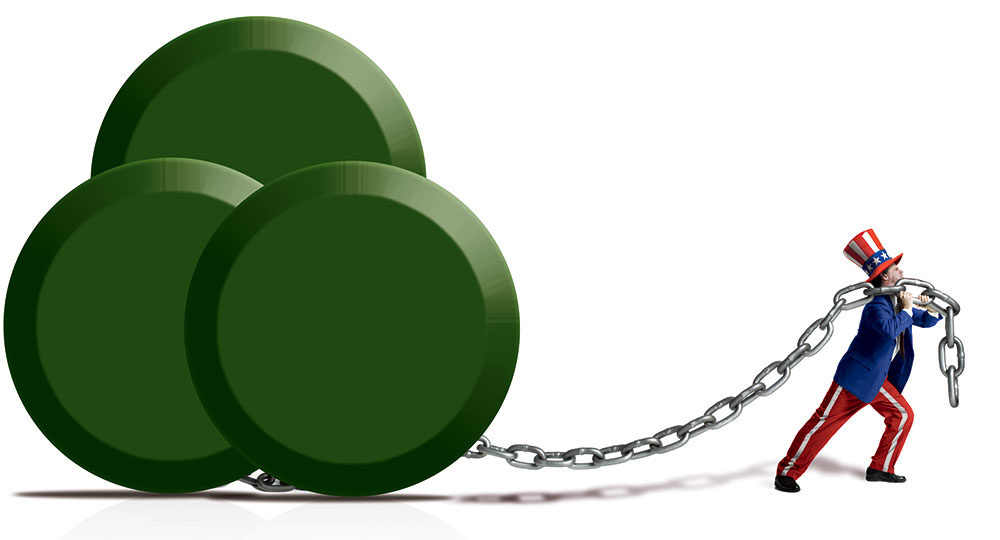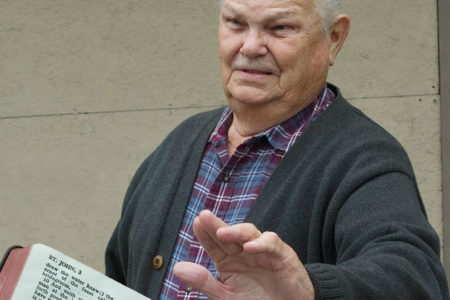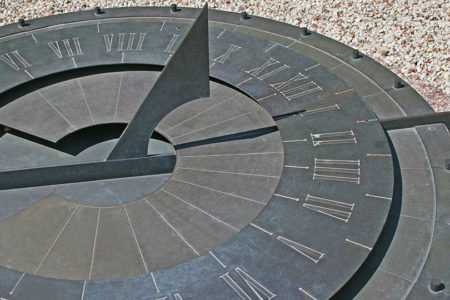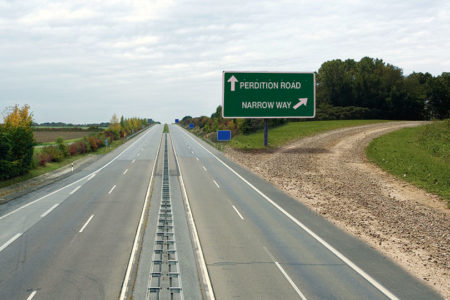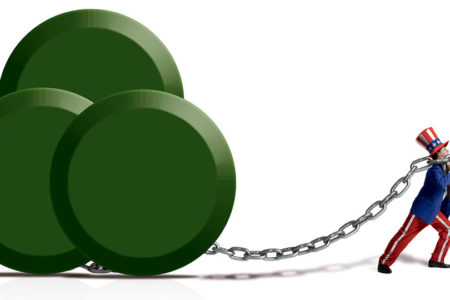The Ghost of America Yet to Come
Sometimes traveling to an unfamiliar place differs significantly from what you had imagined.
That was the case last year when my wife, Janet, and I traveled to the Netherlands. The trip, graciously provided by a Dutch publishing house that had translated a number of my legal suspense novels into the Dutch language, was to be a tour to promote my books. But it ultimately proved to be much more.
In addition to the usual television, magazine, and newspaper interviews and some book signings, I addressed law students—many of them Christians—at Leiden University. I also debated a secular research historian on the relationship between church/state/politics and took questions from the crowd.
Not surprisingly, the event coordinators were also anxious to tap into Janet’s expertise as a nationally syndicated radio and television broadcaster, and she ended up joining me in the debate. We also jointly addressed students and faculty at two large Christian high schools.
Although I knew full well that the Netherlands sanctions homosexual marriage, euthanasia, hate-crime laws that threaten to intimidate the church into silence, and legalized prostitution and “soft drugs,” the vision I returned home with had less to do with that tiny Dutch nation and more to do with the future of the church in America.
So Small a Nation, So Large a Problem
In Amsterdam’s infamous “red light” district, prostitutes openly display themselves in front of plate-glass windows. Little cafes called “coffee shops” dot the streets of most of the cities, but they have little to do with coffee. They are the spots where legalized drugs are sold and imbibed by customers who sit idly at tables surrounded by a constant haze of cannabis smoke. In addition, the Netherlands became the first nation to legalize so-called “mercy killing” after Holland informally fostered the practice for years.
But this small country is also a land of strange paradoxes. Although same-sex marriage (one of the newest political evidences of libertine decadence) is legal, Islam—an innately repressive religion—has become an increasing demographic reality. About 6 percent of the nation is now being categorized as Muslim. Large mosques are being constructed in most of the major cities.1
These social factors add fuel to the hate-crime laws. By the time we landed there, a well-known Dutch cartoonist who goes by the pseudonym Gregorius Nekschot and who had published cartoons critical of Islam was under government investigation. Police had raided his home and seized his computer. If convicted of hate-mongering, he could spend a year in prison for what most of us would consider an exercise of free speech.
Christians, too, have been targeted. A Christian law student told me that when a Christian leader made “politically incorrect” statements about homosexuality during a news interview, he was turned over to the government and subjected to a criminal investigation. The student also confided to me the serious threats he has received for sharing his faith with a Muslim coworker. The threats came, by the way, not from the coworker but from the employer. He said such problems are not unusual in the Netherlands.
Nature Abhors a Vacuum
For years I have heard the phrase nature abhors a vacuum. I first remember hearing it from my father who had a degree in engineering. Apparently, its origin is attributed to Aristotle and has to do with the complexities of thermodynamics.
But my use of the phrase is much simpler: Whenever the church retreats, a vacuum results. And it can be considered a veritable “law of nature” that the enemy of the cross will quickly fill that vacuum with his own hellish agenda.
A secular journalist who thinks the libertine laws in the Netherlands make sense explained how they came about. After noting that prostitution was legalized in 2000, homosexual marriage adopted in 2001, and full-blown euthanasia legalized in 2002, the journalist identified the strategic moment:
It is not a coincidence that several of these laws have been passed in recent years. For the first time in a century, the Christian Democrats are not in the coalition government.2
The Christian Democrat party was populated by Christians, many of them from the Dutch Reformed Church. But the moment it failed to rally a presence in the coalition government, the tide rapidly turned. Admittedly, the Netherlands had been facing an onslaught of liberal legislation and cultural decay for some time. But the dike broke, so to speak, when Christians were silenced.
Dutch Christians told me the traditional church has lost its moral voice. Rather than focusing on its essential, prophetic role of preaching the truth of God’s Word, it became embroiled in disputes over worship styles and even experienced major schisms over which hymns to sing in Sunday services.
The Church of America Yet to Come
The parallels between the Netherlands and America are obvious. Both nations are democratic republics based historically on strong Christian foundations and heritages. The Netherlands housed the pilgrims in Leiden until they finally set sail for Plymouth in the New World. When America fought for its independence, the Dutch extended us essential economic credit. Our histories, in many ways, are inexorably connected.
Most important, the devastating cultural and spiritual state of the Netherlands today ought to be a wake-up call for the church of Christ in America. Like the ghost of Christmas-yet-to-come in Charles Dickens’s famous story A Christmas Carol, the tiny Dutch nation shows us what America may become unless there is a dramatic turn of events.
Here in the United States, Massachusetts and California legalized homosexual unions; and numerous other states are heading in the same direction. California reversed itself, however, in the November 2008 election. Whether the California Supreme Court will again strike down the will of the California voters remains to be seen. Hate-crime laws were passed in both the U.S. Senate and House of Representatives in 2007, and only the last-minute wrangling by conservatives in the conference committee prevented those measures from going to the White House for signing.
I was extensively involved in the issue on Capitol Hill, and it was clear to me that the proponents of that radical legislation were targeting conservative Christians. Their aim was to throttle free speech regarding homosexuality and Islam, specifically.
To be fair to the Netherlands, there are some hopeful signs. The nation has elected a Christian prime minister who has vowed to make positive changes. Time will tell. Also, there is a slow but growing evangelistic movement there. Interestingly, those I spoke to in the Netherlands said the trend is due mostly to an influx of born-again Christians who are establishing new churches in the large cities.
The Church’s Last Will and Testament
What positive message can we derive from all of this? I am reminded of the apostle Paul’s final sermon to the elders of the church at Ephesus. After nurturing and discipling that church for three long years, he felt the Holy Spirit’s call to leave and return to Jerusalem where, as he had repeatedly been warned, nothing short of arrest and persecution awaited him.
In Acts 20:28–32, we read Paul’s final warning to the church against the crippling, corrupting influences of the world:
Therefore take heed to yourselves and to all the flock, among which the Holy Spirit has made you overseers, to shepherd the church of God which He purchased with His own blood. For I know this, that after my departure savage wolves will come in among you, not sparing the flock. Also from among yourselves men will rise up, speaking perverse things, to draw away the disciples after themselves. Therefore watch,…So now, brethren, I commend you to God and to the word of His grace, which is able to build you up and give you an inheritance among all those who are sanctified.
The only real hope for America is a vibrant church of Christian believers who will be both “salt and light.” But at the same time, the only hope for the church is an absolute commitment to God Himself in a radical, transformational way and a total commitment to the absolute inerrancy, inspiration, and authority of the Word of God. Only then will Christian believers be able to resist the cultural and theological lies of our age—the “savage wolves” that are increasingly being loosed upon us.
If followers of Jesus Christ give themselves to God with abandon and dedicate
themselves to understand—and then apply—the whole truth of the whole of the Scriptures, we cannot help but penetrate in a positive way our families, our churches, our communities, and our nation.
As Jesus said, “I am the light of the world. He who follows Me shall not walk in darkness, but have the light of life” (Jn. 8: 12).
ENDNOTES
- Joshua Livestro, “Holland’s Post-Secular Future—Christianity Is Dead. Long Live Christianity!” The Weekly Standard 012, no. 16 (2007) <weeklystandard.com/Utilities/printer_preview.asp?idArticle= 13110&R=13A8F2BF4C>.
- Yasha Lange, “Live and Let Die is new Dutch religion,” BBC News, April 11, 2001 <news.bbc.co.uk/1/hi/world/europe/1271571.stm>.
